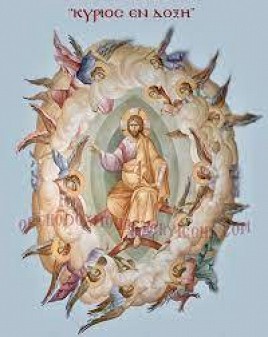Our Church sees its faith as the faith of the heavens, as the life of God himself shared with his creation. It is the faith of the angels and the faith revealed to humans from the very beginning, the faith of "forefathers, fathers, patriarchs, prophets, apostles, etc," as our of our Liturgy says. Of course, there was our Orthodox faith already in Genesis 1, but not the Church as we know it, because the faith was first revealed in shadows and not in the truth. The liturgy was first given in burnt-offerings and whole-burnt-offerings, not in the unbloody sacrifice of the Lamb himself, as we now have it. Nevertheless, it was the same faith and the same liturgy, the old being to the new what a shadow is to its object, what an antitype is to its prototype.
Therefore, we can speak of the Orthodox faith as the faith of Adam and Eve, but we can refer to an Orthodox Church only from Pentecost on. To call it "Orthodox" may be misleading, making it seem as a denomination alongside other denominations, but this is not how we think of ourselves. Simply, we are just "Christians." We are the original Church established with the apostles 2,000 years ago. When it became necessary to come up with a differentiating adjective (that is, after the multiplication of breakaway denominations), our ancestors chose "ortho-dox," which means right-glorifying, or right-worshipping. This is because, resisting every call to define faith, to systematize it and to reduce it to holding certain ideas and beliefs and to doing certain practices, they, like those who came before them in the faith (Israel and, before Israel, the ancestors), saw the substance and proper substantiation of the faith in worship, in the glorification of God. To put it differently, there is no faith outside of worship. The one who worships well or right is the one who has faith.
Of course, this does not mean that our external acts of worship have not changed over time. Or that they will not continue to change. But they change naturally, organically. A famed liturgist wrote recently that Christian worship changes through evolution, revolution, reform, and innovation. Others have changed or have invented their worship in all the latter ways: they cut, they added, they invented, they made it up as they wished, even if seemingly resurrecting something from a distant past (of course, in reality without any direct connection to that past, but only based on imagination). Our liturgy is natural, it is the natural dance of the inner music of the holy life, it grows organically without leaps and bounds, without planned and sudden reforms, without imposed implementations, without major overhauls. It comes all the way from the beginning of mankind like the oak grows out of an acorn, and, just like the oak is found entirely in the acorn, so is our worship present already in “the gifts of Abel, the sacrifices of Noah, the whole-burnt-offerings of Abraham,” as our liturgy says.
This is so because, through its entire growth our worship has never lost its character, that essential identity with the acorn, which is first and foremost defined as sacrifice. In worship we sacrifice. We offer to God a bit of incense, candles, our standing, our prostrations, all our small and insignificant efforts, and ultimately we offer him his own body and his own flesh, fully aware that we can only give him what already belongs to him. As we say, we are "offering to you your own of your own." But this offer, the sacrifice, is the essential aspect of worship. St. Nikolas Kavasilas says: “it is the accomplishment of the sacrifice that forms the essential element in the mystagogy (or, liturgy).”
So come and see how the apostles would have worshipped today, had they lived in our own times!
 Orthodoxy in America
Orthodoxy in America